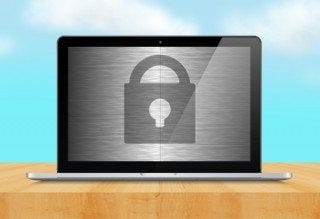Writing Insecurities
We all have writing insecurities, but this is one is an easy fix: Make sure you’re protecting your work and your computer from theft, damage, and failure.
Recently a friend of mine was writing at a coffee shop, and she stepped away from her bag briefly -- but this was just long enough for a sneaky thief to grab it and disappear. She lost her wallet, keys, and her laptop, but the worst thing she lost – the most irreplaceable thing – was her work in progress. Her latest changes hadn’t been backed up, and she was on deadline. A writer’s worst nightmare!
Now imagine going to a writing workshop for six weeks and losing your laptop – the thing you need for writing. This happened to four students at the Clarion West Writers Workshop in 2008, when thieves broke into the house and made off with several laptops.
Happily, in both of these cases, the amazing online community raised money to replace the stolen computers in a weekend. As writers, we know how important computers are to our work, and in many cases to our livelihood. And as readers, we want our favorite writers to keep producing stories.
Even if you write by hand in a notebook or use a typewriter (really?), chances are that at some point you need a computer. Computers are tools for drafting, editing, revising, e-mailing agents and editors, playing Portal, posting on Twitter, and more. So why do so many people fail to secure them? Some just don’t think about it, or figure they’ll never have to worry about it, but laptop security also seems like it might be annoying to set up or expensive. It doesn’t have to be.
Here are some very basic things you can do to make your laptops a little more secure, and especially avoid losing your work.
Back up your work! Everyone knows this is important but too many still don’t bother. Make sure you have copies of your work, preferably in multiple places. If you write a lot away from home, bring a USB thumb drive or an SD card and make a backup every time you finish a writing session. You could also sync your work to a cloud storage account like Dropbox, if you can get online. Scrivener and Dropbox work pretty well together to share your projects with multiple computers and save backup files. Even if you lose your laptop, at least you won’t lose the latest draft of your novel.
Make it easy for people to contact you if they find your device. I left my tablet on a train once, but I had saved my contact info on the home screen, and the right person found it and called me. You can (and should) do this with your smart phone too. It’s trickier with a laptop; I usually just tape my business card to the bottom of it. I’ve also set up a guest account so if anyone logs in to it, they’ll see custom Windows wallpaper with my contact information (above).
While you’re at it, make sure it’s password-protected. Your devices should have passwords on them to prevent (or make it harder) for unauthorized people to access your files – and erase them and claim your computer as their own. In addition to the boot password, PCs and Macs allow you to add a BIOS password so other users can’t easily get around your regular password or wipe the system. If you want to go all out, you could also encrypt your hard drive…
Make your laptop harder to steal. For some laptops, you can still buy those security cables to attach them to a table or something (or you could just not leave your laptop lying around unattended.) There’s also a product called the STOP Security Plate – a nigh-impossible-to-remove, highly visible plate stuck onto your laptop that announces it as stolen. This makes it difficult to resell and serves as a way to register your laptop so it can be identified easily. In theory, a thief that sees this -- or a bunch of stickers that make your computer look unique -- won’t bother to take your laptop in the first place. (Full disclosure: I haven’t gotten mine yet, because I don’t want to stick it to my pretty new laptop.)
Install tracking software. You’ve heard the stories about people tracking down the thief who took their laptop using GPS coordinates and the webcam. It really happens! But the confrontation is probably best left to police. Still, you can help them find your laptop with tracking software hidden on your computer. Macs have Undercover, but you can also install LoJack or Prey (which includes a free version) to track and remotely lock or wipe PCs or Macs. If you do this, you may also want to set up an unlocked guest account to entice the thief to log in so the laptop can connect to a Wi-Fi network.

These are just some of the precautions you can take. Of course none of them are foolproof, but some security is better than none, and at least you have a better chance of recovering your laptop and not losing any work.
Does all this seem paranoid or do you think it’s a good idea? What other security measures do you take to protect your laptop and work? Comment below!







